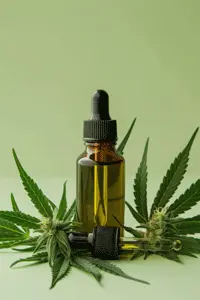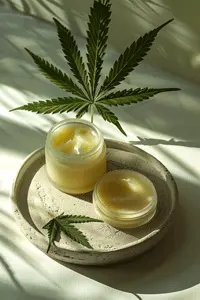Living with chronic inflammation is like carrying around an uninvited guest who ruins your plans, slows your steps, and saps your energy. Whether it presents as arthritis, aching joints, back pain, or simply a general stiffness that makes everyday movement feel like a chore, chronic inflammation can significantly impact your quality of life.
But here is the good news: Mother Nature may have already handed us an anti-inflammatory superhero in the form of cannabis. Let's discover the natural connection between cannabis, inflammation relief, and better mobility.
Inflammation 101: The Not-So-Fun Fire Inside
Inflammation is your body's natural response to injury or infection. It is like your immune system turning on the alarm bells and sending reinforcements to handle the issue. But when the alarm system malfunctions, because of stress, poor diet, autoimmune issues, or wear and tear, your body can stay in fight mode far too long. That is where chronic inflammation kicks in.
Common symptoms?
- Joint stiffness
- Muscle pain
- Swelling
- Reduced mobility
- Fatigue
Chronic inflammation is linked to conditions like rheumatoid arthritis, osteoarthritis, fibromyalgia, and even gut and skin issues.
How Cannabis Enter the Chat
Enter cannabis, a plant that has been used for centuries in traditional medicine for its pain-relieving and anti-inflammatory powers. Let's break down how cannabis helps:
Cannabinoids vs. Inflammation
Cannabis contains over 100 active compounds called cannabinoids, but the two most famous ones are:
- CBD (Cannabidiol) – Non-psychoactive, known for its calming, anti-inflammatory, and pain-relieving effects.
- THC (Tetrahydrocannabinol) – Psychoactive (it's what makes you feel "high"), but also has strong anti-inflammatory and analgesic properties.
Both CBD and THC interact with your endocannabinoid system (ECS), a network of receptors in your body that helps regulate things like pain, immune function, mood, and yes, inflammation.
According to a 2020 review published in Frontiers in Pharmacology, both THC and CBD have shown strong promise in modulating the immune response and reducing markers of inflammation in both animal and human models.
Cannabis and Mobility: A Dynamic Duo
Inflammation stiffens joints, weakens muscles, and makes simple movement feel like a gym session. But cannabis can help loosen the grip. Here's how:
1. Pain Reduction = More Movement
Cannabis is widely studied for its pain-relieving properties. Reducing pain means you can move more freely, and when you move more, you feel better. Studies have shown that patients with arthritis who used cannabis reported significant reductions in pain and improved sleep and mobility.
2. Muscle Relaxation
THC has muscle-relaxing properties that can help reduce spasms and ease tension around inflamed areas. Perfect for post-workout recovery or flare-up days.
4. Neuroprotective Benefits
Chronic inflammation affects not just your joints, but your brain and nerves too. Cannabis (especially CBD) has neuroprotective and antioxidant properties that support overall nervous system health.
What Science Says (and Doesn't Say Yet)
While cannabis is gaining popularity as a wellness tool, it's important to be clear: we still need more large-scale, long-term clinical studies. However, smaller studies and anecdotal reports continue to build the case.
- A 2022 study in Current Rheumatology Reports concluded that cannabinoids may be beneficial in managing arthritis pain and inflammation, with fewer side effects than conventional medications.
- Harvard Health Publishing notes that CBD has been shown to reduce inflammation and help manage chronic pain, especially when used consistently.
Real Talk: Cannabis Isn't a Magic Pill
Let's be honest: cannabis isn't going to cure your arthritis overnight. But it can be a powerful tool in your mobility wellness kit, especially when paired with:
- A healthy anti-inflammatory diet (hello, turmeric and omega-3s)
- Gentle stretching or yoga
- Movement practices like swimming or walking
- Stress management (because stress = inflammation fuel)
Choosing the Right Cannabis for Inflammation Relief

Here's a quick guide to help you choose the best warrior to fight your inflammation. When you need full-body relief, you can try CBD oil or a tincture. When you suffer from pain, inflammation and sleeplessness then a balanced THC:CBD combo can do the trick. For local pain, try a cannabis-infused topical balm. If you require daytime use, the CBD-dominant or low-THC strains are best to use. But for nighttime relief, the higher THC for deeper relaxation will be perfect.
Always start low and go slow, especially if you are new to cannabis. Talk to a healthcare provider, especially if you are on other meds or have a complex condition.
Conclusion
Our final thought today is to remember that your body deserves to move freely.
Inflammation might be a part of your life, but it doesn't have to call the shots. Whether you are managing arthritis, recovering from injury, or simply trying to stay active as the year adds up, cannabis offers a natural and effective way to support your joints and reclaim your movement.
So stretch it out, take that walk, and maybe give that cannabis balm a try. Your joints might just thank you.
Sources and Reference:
- Frontiers in Pharmacology, "Cannabinoids and the Immune System: Clinical Relevance" (2020)
- Canadian Medical Association Journal, "Medical cannabis for the treatment of chronic pain" (2021)
- British Journal of Clinical Pharmacology, "Cannabidiol as a potential treatment for anxiety and neuroinflammation" (2019)
- Current Rheumatology Reports, "Cannabinoids in the Management of Rheumatic Diseases" (2022)
- Harvard Health Publishing, "Cannabidiol (CBD) – what we know and what we don't" (2021)
Disclaimer: This blog supports responsible cannabis use. The information contained in this article is for educational and informational purposes only and is not intended as health or medical advice. Always consult a physician or other qualified health provider regarding any questions you may have about a medical condition or health objectives.

Can Cannabis Help with Inflammation and Mobility?